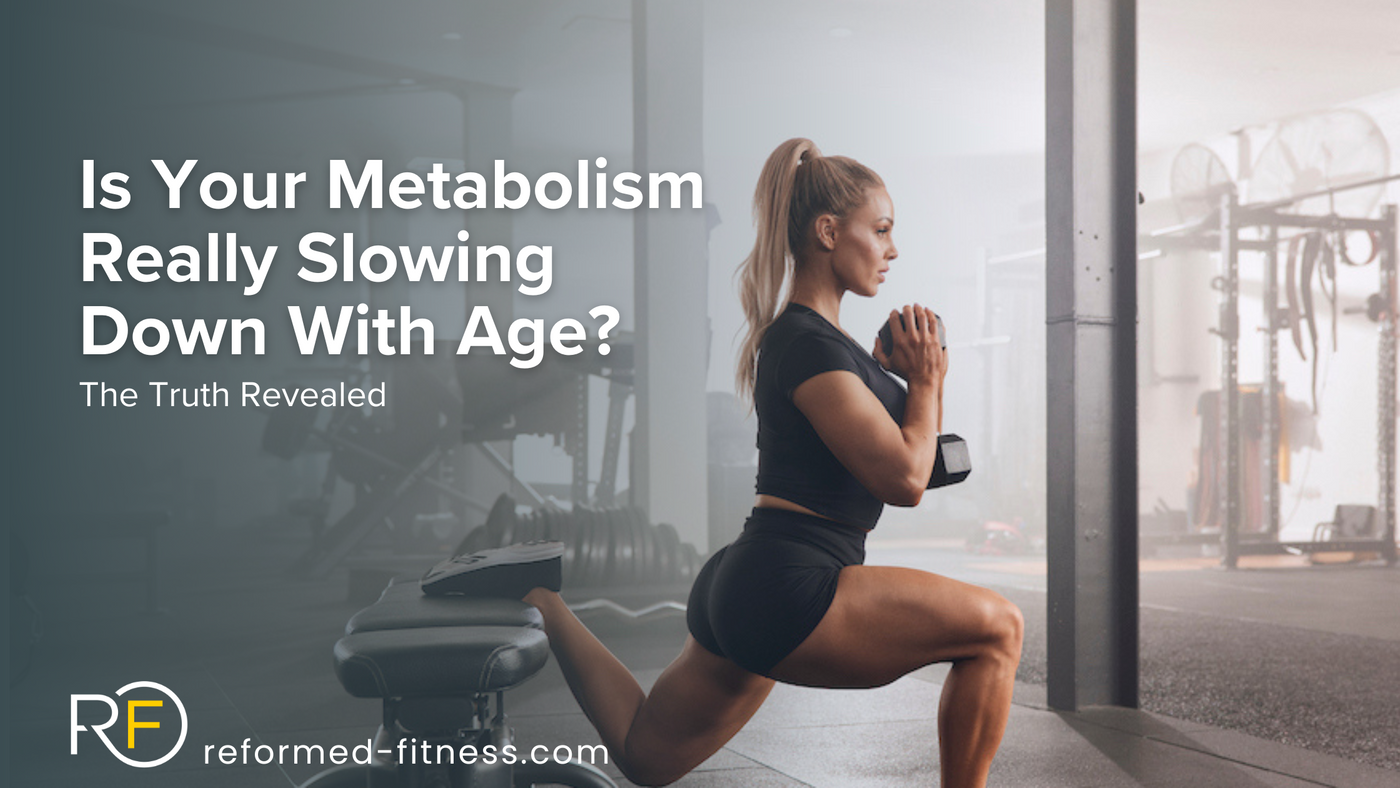We’ve all heard it: "Your metabolism slows down as you get older." It’s one of the most common explanations for why people in their 40s, 50s, and beyond start to see weight gain and muscle loss. But what if I told you the real culprit isn’t your metabolism itself?
In fact, your metabolism might not be the problem at all. At Reformed Fitness, we see clients in their 40s and 50s dramatically improve their metabolism—while their peers struggle with decline. The key is understanding what really happens to your body over time and how simple, sustainable habits can reverse these changes. Let's break it down.
The Metabolism Myth
The idea that your metabolism grinds to a halt as you age is a common misconception. Research shows that your metabolism doesn’t drastically slow down with age alone. What truly happens is a decline in physical activity and muscle mass—factors that contribute to fewer calories burned daily.
As we age, most of us become less active, and we naturally start losing muscle through a process called sarcopenia. This reduced activity, paired with muscle loss, leads to a decrease in your Total Daily Energy Expenditure (TDEE)—meaning you burn fewer calories overall.
This is why many people think their metabolism has slowed down. But the good news is, you can reverse this! By focusing on what truly matters—your activity level and muscle mass—you can keep your metabolism firing on all cylinders, no matter your age.
Why Muscle Matters More Than You Think
Muscle is metabolically active tissue, which means it burns more calories at rest than fat. As we lose muscle mass with age, our calorie-burning potential drops. This process, known as sarcopenia, begins as early as your 30s and accelerates over time—especially if you’re not strength training.
But here’s the great news: muscle loss isn’t inevitable. It's preventable, and even reversible, with the right approach. At Reformed Fitness, we’ve helped countless clients regain muscle and reignite their metabolism with just two 30-minute strength training sessions per week. The key is consistency and focus on muscle-building activities.
For example, one of our clients, Gabriela, came to us in her 60s frustrated by failed attempts to lose weight and build muscle. She had tried fad diets, extreme workout plans, and even long hours at the gym—but nothing stuck. She felt like her metabolism had completely given up on her. But after just a few weeks of implementing simple, consistent strength training and movement into her routine, Gabriela not only lost fat, but she also started building muscle which raised her metabolism.
Now, Gabriela feels stronger, more energized, and confident that her metabolism is back on track. This shift in her habits will not only help her maintain her weight but also extend her lifespan and improve her quality of life for years to come.
The Science Behind Metabolism and Age
So, what does the research say about how metabolism changes with age? A recent study from the Journal of Exercise Science & Fitness looked at over 6,000 participants from infancy to old age. The results showed that, between the ages of 20 to 60, metabolism remained remarkably stable. It wasn’t until after age 60 that participants experienced a gradual decline.
This means that, for most of us, metabolism isn’t slowing down as quickly as we think—it’s our habits that change. Factors like reduced physical activity, loss of muscle mass, and lifestyle choices play a bigger role in the shift we see in our bodies over time.
If you want to keep your metabolism strong, the solution isn’t extreme diets or excessive cardio—it’s about building and maintaining muscle, staying active, and keeping your daily habits in check.
Small Changes, Big Results
The key to keeping your metabolism efficient is to focus on small, consistent changes. Here's how:
1. Move More Every Day: Whether it’s walking, stretching, or light activity, keep moving throughout your day. Just 10 minutes of brisk walking can boost your metabolism.
2. Strength Train Twice a Week: Muscle is your metabolism’s best friend. Regular strength training helps you preserve and build muscle, which means you burn more calories, even while at rest.
3. Stay Hydrated and Eat Well: Your metabolism functions best when your body is well-nourished. Drink plenty of water and focus on high-protein, nutrient-dense foods that fuel your muscles and energy levels.
4. Consistency Over Perfection: The key isn’t doing everything perfectly but staying consistent. These small, manageable steps will help you feel your best—no matter your age.
Age is Just a Number—Activity is Key
Here’s the bottom line: your metabolism doesn’t have to slow down just because you’re getting older. What truly matters is staying active, maintaining muscle mass, and embracing simple, effective habits.
At Reformed Fitness, we’ve seen clients in their 40s, 50s, and beyond improve their metabolism while others around them are experiencing decline. With just two 30-minute workouts per week, we help people build and maintain muscle, stay active, and feel stronger than ever.
Ready to Boost Your Metabolism and Feel Your Best?
If you’re ready to take control of your health and stop worrying about your metabolism, we’re here to help. At Reformed Fitness, our expert coaches design personalized plans that fit seamlessly into your lifestyle—helping you maintain muscle, stay active, and feel energized at any age.
Schedule your FREE Discovery Call and find out how easy it can be to integrate short, impactful workouts into your busy life.
Stay Fit,
Xavier Robinson
Founder, Reformed Fitness

